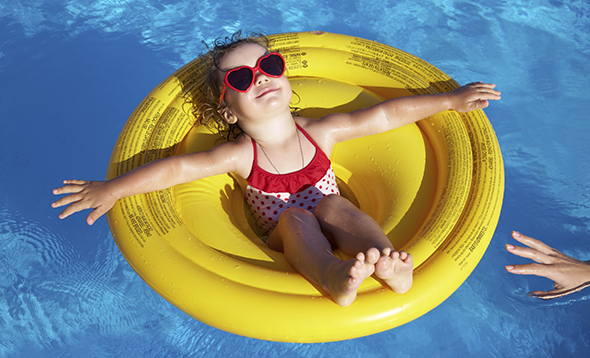That organic living is a conscious health choice
Travel Tips for Healthy Families
Chances are, you’ll be packing in a family holiday or two into the children’s summer break. Take the stress out of what should be fun family time by planning ahead. Sidestep the impact of jetlag by getting plenty of rest before your trip and trying to adjust the family’s sleep schedules two to three days before you leave to match the time zone you’re traveling to. When this is not possible because you’re travelling a long distance and the time difference is simply too vast, try to book an overnight flight to coincide with your child’s sleeping schedule. Try to get some sleep on the flight, but be sure to stretch regularly when you’re on the plane. Dehydration also exacerbates jet lag, so ensure that everyone drinks plenty of water. Pack a refillable sippy cup or water bottle for your child so that there won’t be spills to deal with on the flight. Avoid alcohol, coffee, tea and other caffeinated drinks. When you arrive, set the first day aside for everyone to just relax and catch up on some sleep. Try to follow the local time at your destination. Encourage the kids to run around and play outside or in brightly lit areas during daylight hours. This helps their bodies adjust to the new time zone. And build in down time. Plan for nights in so that everyone clocks in much needed shut-eye. Pack natural sleep aids, such as essential oil blends, that can help ease your little ones as well as yourself, into deep sleep and enhance the quality of your rest.
During take off and landing, it is common for children to experience ear discomfort. Try to time baby’s feeds for these parts of the flight. Nursing or sucking on a bottle helps ease the pressure. For older children, having something to eat or drink also helps. If they aren’t hungry, have a vitamin C lollipop (or a pacifier if your toddler uses one) on hand.
Apart from ensuring that the family is well hydrated, it is also useful to pack a travel snack box. It is equally handy on the plane, when you’re on long drives or out just for the day (healthy snacks are a great alternative to convenience foods). Fill zip bags or a snack box with easily transported food that keeps well and will not get soggy or spill. For longer trips, pack them into an insulated bag. Great snacks include: fresh fruit such as oranges or tangerines, apples, bananas and grapes; vegetables (baby carrots, edamame, crudité) or breadsticks with some dip; hard cheese; store bought or homemade trail mix; whole grain crackers, cereal and granola bars; fruit roll ups or fruit bars; single serve yoghurt and plain milk (rather than sugary drinks); and sandwiches. Where possible, cut food into bite-sized portions to minimise mess. And pack portions for each child to avoid arguments.
If you are concerned about not being able to get access to organic products when you’re traveling, pack your children’s favourite less perishable organic snacks such as biscuits, crackers, cereal, granola bars, fruit roll ups, fruit bars and even prepackaged fruit and vegetable pouches. Even apples and oranges will travel reasonably well.
When dining out, don’t limit your kids to the children’s menu. Look for the healthy options on the regular menu. Ask if the restaurant can provide a child-sized portion of an item on the menu or order it along with an appetizer for yourself and share the main with your child. If nothing on the menu appeals to your child, whip out your travel snack box. Similarly, pack lunch for long day trips to the amusement park or beach. And don’t forget to be a good role model. While it’s natural to indulge while you’re on holiday, opt for treats such as fruits that you can’t get at home.
Beat constipation by giving your child plenty of fluids (that sippy cup or water bottle you packed for the flight will come in handy) and make sure that his or her diet contains plenty of fibre-rich fruit, vegetables and whole grains (the travel snack box is a useful way of achieving this). Don’t skip everyone’s daily vitamins when you’re traveling. They will actually help if you cannot maintain your child’s regular diet. Taking probiotics before and during the trip can also help boost the family’s immune system. And have vitamin C supplements on hand to boost everyone’s immunity while on the road.
In addition to vitamins and probiotics, be sure to pack your children’s regular medication for common ailments such as fever, coughs and colds. A first aid kit as well as over the counter painkillers, teething gel, a chest rub, sunscreen, insect repellent, a travel-sized bottle of hand sanitizer, inhalers and allergy medication (if needed) are also essential. You don’t want to be searching for these in an unfamiliar location or grappling with a foreign language while you’re at it.
When traveling from warm to cold weather, it helps to layer your children’s clothing. Have a blanket handy for extra warmth. And a hat goes a long way in keeping your little one’s body warm. Don’t forget to pack warm pyjamas or layer bedtime clothing if necessary. If you’re staying at a hotel, adjust the temperature in the room to stay a bit warmer. Protect skin from cold, dry air by moisturising daily, using mild soap, and taking shorter warm—rather than hot—showers (hot water dries skin out faster and strips it of its natural oils). Protect lips with a hydrating lip balm with sun protection. And use a sunscreen, even in the cold. When selecting skin care products, choose all-natural ingredients (such as vitamins E and A, and shea butter) that will help keep skin hydrated.
But most important of all, relax and have fun. Plan and pack ahead, then just play hard, rest well and have a fabulous family summer break!


























_1672804154.jpg)

_1611290459.jpg)